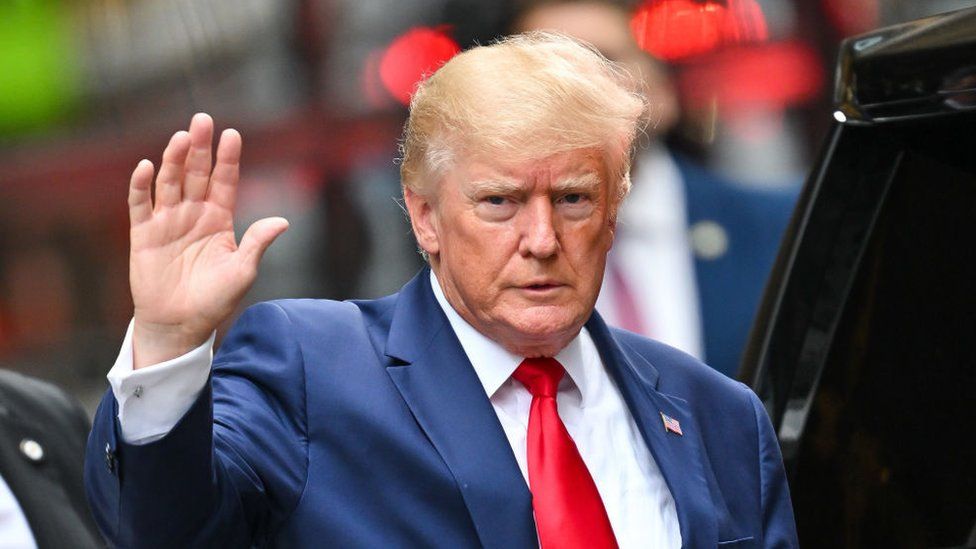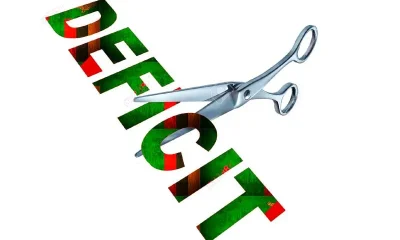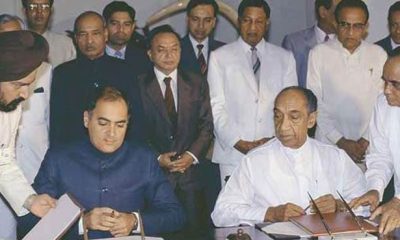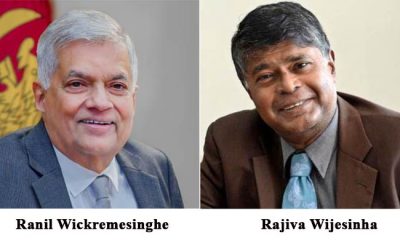Opinion
Business vs Covid19 or Health before Wealth?

Hard-nosed business has been the bane of many countries when it came to controlling the spread of Covid 19. We see it all over the world, especially where business has influence/control over politics. USA, UK Brazil etc. have suffered and is still suffering the worst brunt of the virus outbreak. Why? Because they listened to business instincts than health warnings. Economics sense took priority over health risks. By their actions, they have jeopardized not only businesses and economies now, but the whole country as a result.
Only a few weeks ago in the Island newspaper, a doctor wrote a very pertinent piece on the choices we are left with in the face of the current pandemic. Open up the country for economic reasons and risk health repercussions or stay closed and healthy. One is at the expense of the other, whether you like it or not. It is the reality. She gave very prudent advice to look for safe economic activities that can flourish within a closed country, at least for the time being.
Sri Lanka which had strict lockdown in the 1st wave of the pandemic, had almost negligible cases and deaths. We beat the virus beautifully. We were one of the top countries in the world to have done so. We have shown the world how it is done, for so many months. But then the economy was biting and Sri Lanka needed to listen to the rumblings of the businesses. As businesses were allowed to open, it was a matter of time.
One can bet on the hard nosed business people to break or flout the health guidelines at their whim. Brandix cluster is a prime example of bending and bypassing health regulations. It cost Sri Lanka a second wave and a heavy price in human lives. Now we are doing the same with tourism. Hard Nosed businessmen have already flouted the health rules within days, and burst the health bubble supposed to be maintained around tourists, Why this total disregard to the risk factors to the rest of the country? It’s Just to keep their businesses going. If the whole country is plunged into a health crisis because of it, is not their worry. Foreign currency jangling in their pockets, is all that matters.
Today the UK went into total lockdown. The USA will follow suit. Japan is declaring an emergency. The world is far from over the hill where Covid 19 is concerned. Sri Lanka will also have to come to total lockdowns soon, if the current trend in the virus spread continues, without being arrested. Whatever the methods and control systems that are in place are not working, it seems. We need to be dynamic in our policies and actions when dealing with this virus. If one method is not working, it needs to be changed, and changed very quickly. We need to respond accordingly.
Yes, the tourism industry is suffering. But this is not the time to revive it with the huge risks involved with that industry. Most countries have closed borders for foreigners. Even India. Some are not even opening to their own countrymen to come in from abroad, as in Canada. This is considering the risk the returnees pose to the rest of their countrymen at home. But what is happening in Sri Lanka? I think it’s a case of too many cooks spoiling the soup situation here. During the first wave, only the president was in charge and he was happy to let the health authorities do their work, unhindered by himself or anybody else. The task force formed was devoid of any political or business interests. They had no other agenda than saving the country from an unknown and microscopic enemy. The forces, police and the health sector was more than equipped to handle it and control it effectively. And they did. Then came elections, and the parliament, and the usual cacophony of noise, opinions, protests, oppositions, etc which the president is compelled to listen to. And of course, the voice of the businesses rose through the mouths of the politicians in the parliament. Rescue us, was their cry .We are going under, they screamed.
As the good doctor who wrote to the Island advised, we need to look local for business. To keep the economy ticking, there are a lot of businesses/economic activities that can be done along with health restrictions. Local supplies, local tourism, local produce and agriculture, and the biggest – the exports. Exports of produce, goods, and services like IT, financial services etc. All this can be done without opening the country to outside risks. We must adhere to the ‘Safety first’ rule, as said in any construction project site.
There are ample examples when health bubbles burst. It’s a matter of time. Brandix was one instance. Now the Ukrainian tourists’ project. It won’t be too long before we have a ‘tourism’ cluster too. This is not going to fare well with any tourist initiatives Sri Lanka will do in the future. Sri Lanka should be known for its wellness and health tourism. Going by the health guidelines ignorance shown by the businessmen, travel agents, service providers etc involved with it, wellness would be the last thing to be associated with Sri Lanka tourism. A country should not be put at risk for the fancy of one businessman, who wants to showcase his colors or rescue his tarnished reputation.
There are many countries that have fared well in the face of this tragic pandemic. Not just wealthy countries like New Zealand, Australia, China etc., who are rich enough to weather the economic battering of a total shutdown; but small countries like Vietnam and Cambodia who have cracked the secret of controlling the pandemic from ravaging their countries. Cambodia has NO deaths and a few 100’s of Covid cases since the pandemic began. How come? I’m sure they suffered economically as much as any other country. But their priorities were right. Health before wealth. Let’s do the same Sri Lanka. Because even if we pursue an economy driven agenda now, the virus will bring us to our knees soon, and force us to total lockdown, like it is doing in countries which dared to carry on business as usual with minimum restrictions. They are all forced to go into total lockdown now. The UK , USA are prime examples of business driven health policies, now paying the price with the lives of their citizens.
What is Sri Lanka’s choice? To go ahead and open up the country, calculating and knowing fully well the human cost of it, and accepting it. Or going it safe for everybody. Unfortunately it looks like this decision is up to the politicians to make. Not the health authorities nor police nor the armed forces, which managed it beautifully all on their own in the first wave of the pandemic.
CITIZEN S
Opinion
The second term of Donald Trump: What could we expect? – Part II

by Tissa Jayatilaka
(This article is based on a talk given to the members of the Sri Lanka Foreign Service Association on the 10th of December, 2024. First part of it appeared in The Island of 01 Jan. 2025).
Karl Rove, a veteran conservative political operative, wrote recently in the Wall Street Journal as follows:
Rather than for any particular skill or competency, Mr. Gaetz was selected because he promised he would spite Mr. Trump’s enemies within the Justice Department and hound his opponents outside it. Senator Markwayne Mullin, the junior senator from Oklahoma, essentially said much the same when he said, “I think the President wants a hammer at the Department of Justice (DoJ), and he sees Matt Gaetz as a hammer”. When asked if she would vote for Gaetz, Senator Marsha Blackburn said that she and her fellow Republicans are ready to support “every single one of Trump’s nominees”. Trump’s replacement nominee for Attorney General Pam Bondi, the senior senator from Tennessee has vowed to pursue Trump’s retribution agenda.
The Department of Government Efficiency or DOGE was first announced by Donald Trump about a month or so ago. Elon Musk and Vivek Ramaswamy, two billionaires and possibly the two highest financial contributors to Trump’s election campaign are to be in charge of the new department. Trump envisions that DOGE “will become, potentially, The Manhattan Project of our time”, the President-elect wrote on his social media platform referring to a top-secret World War 11 programme to develop nuclear weapons.
Though DOGE has Trump’s support and has the word ‘department’ in its name, it is not an official government department that has to be established through an Act of Congress. Instead DOGE, it is believed, will operate as an advisory body, run by two of Trump’s right-hand men with a direct line to the White House. In an article published in the Wall Street Journal a few weeks ago, Musk and Ramaswamy said they would “serve as outside volunteers, not federal officials or employees”. Their task is to provide guidance to the White House on spending cuts and compile a list of regulations that they believe are outside the legal authority of certain agencies and ought to be revised or discarded.
Government reforms by way of major cuts appears to be the remit of DOGE. The federal bureaucracy “represents an existential threat to our Republic”, Musk and Ramaswamy have written in the Wall Street Journal. “Unlike government commissions or advisory committees, we won’t just write reports or cut ribbons. We will cut costs”. At what cost they will do so is anybody’s guess. And the pair of billionaires have threatened to slash federal regulations, oversee mass layoffs and totally shut down some agencies. We should bear in mind in this context that during his campaign to secure the 2024 Republican presidential nomination, Ramaswamy vowed to do away with the Department of Education (DoE) – – something Trump repeated days after winning the election. He released a video announcing that the DoE’s days were numbered. “One other thing I’ll be doing in the administration is closing up the DoE in Washington D.C. and sending all education and education work and needs back in the States”). For his Education Secretary, Trump has picked Linda McMohan, the co-founder of World Wrestling Entertainment, who served as head of the US Small Business Administration in Trump’s first term.
Speaking at a gala held at Mar – a -Lago in November, Ramaswamy thanked Trump “for making sure that Elon Musk and I are in a position to start mass deportations of millions of unelected federal bureaucrats out of the District of Columbia bureaucracy”.
Even before it has been officially established, DOGE has been set a deadline of 4 July, 2026, to finish its job. When announcing the new body Trump said:
A smaller government with more efficiency and less bureaucracy, will be the perfect gift to America on the 250th Anniversary of the Declaration of Independence.
These are large claims and threats indeed. Whether they could be actually implemented or not remains to be seen.
Let’s take a look at some others of Trump’s picks for top posts. They have dismayed policy circles in Washington – -including Republican lawmakers and former officials who served during his first presidency.
Trump’s proposed inner circle on the foreign-policy front, is made up of notable hawks including Senator Marco Rubio as Secretary of State and Representative Mike Waltz as National Security Adviser. Rubio is an unbelievably steadfast supporter of Israel and advocates a hardline approach to China, Iran, Cuba, and Venezuela; Waltz is a Green Beret veteran who has been one of Beijing’s fiercest critics. He has consistently supported a tough stance on China.
Fox News host Pete Hegseth, Trump’s initial pick for Secretary of Defence, raised howls of protests from even among Republicans. He is a decorated Army veteran but has little or no direct experience in the Pentagon or government. He has referred to Army generals who adhere to diversity, equity and inclusion efforts as “woke shit” and said that women should not serve in combat roles. Hegseth has been accused of alcohol abuse, financial mismanagement, and sexual misconduct. It looks almost as if sexual misconduct or allegations thereof is a pre-requisite for higher office in Trump’s second term! Happily, there are unconfirmed reports that indicate Trump now has second thoughts about Hegseth as a nominee for his Secretary of Defence. One of the names in circulation as a possible replacement for Hegseth is Florida Governor Ron de Santis.
Military veteran Tulsi Gabbard, who left the Democractic Party in 2022 and became an independent, is Trump’s nominee to be the Director of National Intelligence, regardless of her lack of direct intelligence experience. John Bolton, one of Trump’s former National Security Advisers, described Gabbard’s nomination as “hilarious” in a post on X. Bolton is on record as saying that Trump cannot tell the difference between the national interest and his personal interest.
Rubio, Hegseth (in case he remains Trump’s nominee for Secretary of Defence), Gabbard all require Senate confirmation before they can serve in their respective posts. According to information in the media Senate Republicans are unlikely to give Trump and his nominees a free pass.
Let me now take a close look at the likely main features, discernible at present, of Trump’s foreign policy during his second term. It is expected to be more of the same as during his first term; a trade war with China and hostility to multilateralism.
Steve Holgate, another of my former U.S. Foreign Service Officer-colleagues, is also an intimate friend. He has had experience working with the U.S. Congress and headed a committee staff in the senate of his home state of Oregon. Holgate, a perceptive observer of the passing political scene with whom I exchange views frequently, (which diverge at times) has pointed out, and I agree, that Trump clearly has an isolationist impulse. Trump’s vow to put “America First” and “Make America Great Again” taps into sentiments that date back to the beginnings of the American republic when George Washington and Thomas Jefferson talked of the uses of isolationism, though not as whimsically as Trump now does. What this will mean is hard to say, as he, unlike Washington and Jefferson, is totally mercurial. He has indicated that he would stop supporting Ukraine. Holgate thinks this would have catastrophic results, for not only would the United States be abandoning a troubled but functioning democracy but it, under Trump’s leadership, may also mean that the United States would be betraying and abandoning U.S. NATO allies, who have really stepped up. Not only will this be harmful in itself but it could, Holgate notes further, persuade China to conclude that the United States would do nothing if China invades Taiwan; and allow Kim (Jong Un) to recalculate the risks of invading the South. Xi has shown that he is more than willing to rattle sabres in order to distract the Chinese from their internal problems, especially on their economic front. Therefore, Xi may find it handy, Holgate opines, to strike Taiwan in order to create a spurious domestic unity. We both (i.e., Holgate and I) agree that Trump has always shown himself sympathetic to dictators and Trump would love to be one. His values are opposed to those that have held American democracy and its alliances together. Trump’s threat to impose tariffs on China, Mexico and Canada could not only cause a trade war but would, in turn, weaken the economies of the world including that of the United States. As for Israel, Trump’s impulse is to give it unlimited unconditional support – – unless Netanyahu turns nettlesome and puts Trump off. We know that everything is personal and everything is transactional with Trump.
There are some commentators who feel that it is Hamas who set off the ongoing round of violence, and despite the justified criticism of the force of Israel’s retaliation and the accusations of genocide, the attack by Hamas was also an act of genocide. I have a different take. My sense is that such commentary is akin to a case of bending over backwards to soften the shockingly excessive and totally disproportionate response of Israel to the Hamas attack of 7 October 2023. Now it may be that the latter attack was designed to keep a pending anti-Iranian agreement creating a coalition of Israel, Saudi Arabia and the Gulf States from going through and that is why Iran pushed both Hamas and Hezbollah to attack Israel. But, most of us, including some Israeli citizens themselves and many other anti-Zionist (but not anti-Semitic) activists around the world are of the view that Israel is more to blame as the anti-Israel UN Resolutions (vetoed by the United States) and the findings of the International Court of Justice (ICJ) illustrate. The ICJ found Israel responsible for racial segregation and apartheid against the Palestinians, and pointed to a long list of abuses and violations of international law by the Israeli authorities. And on 21 November, 2024, the UN-backed International Criminal Court (ICC) issued arrest warrants for Israeli Prime Minister Benjamin Netanyahu and former Defense Minister Yoav Gallant (together with a former Hamas commander) citing war crimes and crimes against humanity. The judges on the ICC said that there were reasonable grounds that the three men bore ‘criminal responsibility’ for the alleged war crimes committed ‘from at least 8 October, 2023 until at least 20 May, 2024’.
Bruce Lohof whom I have quoted with approval earlier is of the view that:
Trump will continue the reflexively Israel right-or- wrong addition that has driven US policy in West Asia since Harry Truman was in the White House. I am among those who’ve often thought that the US policy towards Israel surfaces slowly because it has to be translated from the Hebrew.
(To be concluded tomorrow)
Opinion
Wildlife conservation: Dogs to the fore

A passion for wildlife conservation and a love for dogs has led to the creation of a non-profit organisation that trains puppies to protect endangered species.
Dogs4Wildlife, based in Carmarthen, supports frontline conservation efforts across sub-Saharan Africa.
Founders Darren Priddle and Jacqui Law train and develop specialist conservation dogs to support anti-poaching rangers.
“There is no better feeling on this planet than to know that our dogs are saving lives,” said Jacqui.
Darren and Jacqui are professional dog trainers and have been developing operational working dogs for 15 years.
Darren said: “Our love for dogs and our commitment to developing them for specialist work helped us to decide ‘why not?’
“If we are able to train dogs to track people in this country, then why can we not train dogs to help protect our wildlife all across Africa and that’s where Dogs4Wildlife was born.”
The dogs are bred in-house and go through “extensive and advanced training” and a development programme that starts from as early as two days old.
“Relationship is key when deploying a dog to work with anti-poaching rangers,” Darren added.
“We do a lot of relationship building, a lot of conditioning in terms of the patterns of behaviour we want from the dog.
“Whether that be human scent tracking, specialist detection work or operating in a control base on a wildlife reserve.”
The team then “impart all of that knowledge and experience” to the rangers once the dogs have been deployed to a wildlife reserve.
The team has trained and deployed 15 operation dogs to five sub-Saharan African countries including Zimbabwe, Tanzania and Mozambique.
They also provide consultancy and specialist training to different organisations, including the Akashinga, an anti-poaching group in Zimbabwe.
In October, one of their dogs Shinga tracked a poacher 4.5 km (2.8 miles) straight to his front door after a warthog was killed in Zimbabwe.
The team’s work in Africa not only supports the anti-poaching rangers but also communities in the area.
The aim of the programme is to inspire the future generations “to love and support the natural world that surrounds them”, said Darren.
“Whether that be human scent tracking, specialist detection work or operating in a control base on a wildlife reserve.”
The team then “impart all of that knowledge and experience” to the rangers once the dogs have been deployed to a wildlife reserve.
Sunil Dharmabandhu
Carmarthenshire, Wales, UK
Opinion
TRC in a mess; public driven from pillar to post

In an era of rapid technological advancement, one would assume that losing a mobile phone could be addressed swiftly and efficiently. However, for a close friend of mine, Anura (not his real name), a senior professional and well-connected individual, the ordeal of tracing his lost iPhone 15 exposed a web of systemic inefficiencies, poor communication, and hidden truths.
Anura lost his phone on 15 Dec., 2024, while travelling in a Colombo suburb. What followed was a grueling process that highlighted the bureaucratic labyrinth ordinary citizens must navigate. Acting on the advice of two telecommunications veterans, he embarked on a quest to retrieve his phone only to encounter roadblocks at every turn.
Ravi, a retired IT engineer with over four decades of experience, outlined a standard procedure: file a police report, present it to the mobile network provider, and let the Telecommunications Regulatory Commission (TRC) handle the rest. Siri, a board member of a prominent telecom network, confirmed that bypassing the police was not an option due to legal requirements.
Despite their expertise, neither expert was aware of a critical fact: the phone-tracking system had been compromised in 2022. Anura’s initial attempts at the police station were equally disheartening. Officers refused to provide him with a copy of his complaint, citing outdated practices, and he spent hours navigating red tape before finally obtaining a certified copy.
With the police report in hand, Anura visited the TRC in Narahenpita. The experience was no less frustrating. Initially directed back to the police by security staff, Anura had to argue his way into the premises. Inside, a polite but unhelpful officer informed him that the system for tracing lost phones had not been operational since 2018.
The officer defended the TRC’s actions, stating they had informed the Inspector General of Police of the changes, expecting the information to trickle down to individual stations. Anura, however, was unimpressed. “This top-down communication approach is ineffective,” he argued, highlighting the needless time, effort, and money wasted by citizens due to a lack of public awareness.
During his discussions, Anura uncovered an unsettling truth: the phone-tracking system was compromised.
“Your problem,” Anura told the TRC officer, “is sending people here and there without telling them the truth. If criminals know the system is down, they might exploit it—but hiding it isn’t the solution.”
Frustrated but undeterred, Anura vowed to bring the issue to light. He criticised the TRC for its lack of accountability, calling for a more proactive approach to public communication. “If I were the minister or the PM, I would prioritise making citizens’ lives easier and saving public resources,” he said.
On his way out, Anura ensured he had proof of his visit by photographing the TRC’s logbook, documenting yet another step in his relentless pursuit of accountability.
Anura’s experience serves as a cautionary tale about the consequences of poor communication and systemic inefficiencies. It underscores the urgent need for:
Transparent Communication: Regulatory bodies like the TRC must ensure critical updates reach all stakeholders, including the public, in a clear and accessible manner.
Streamlined Processes: Citizens should not have to endure unnecessary delays and expenses to resolve simple issues.
Accountability: Authorities must take responsibility for addressing systemic failures instead of deflecting blame.
As citizens, we must demand better. Until then, stories like Anura’s will remain a stark reminder of the work that still needs to be done.
The aforesaid incident highlights the need for transparent communication, streamlined processes, and greater accountability from regulatory bodies. Anura’s ordeal is a wake-up call for systemic reform to save citizens from unnecessary inconvenience and wasted resources.
Eng. P. N. D. Abeysuriya
Colombo
-

 News6 days ago
News6 days agoService chiefs won’t get extensions; scrapping of CDS Office confirmed
-

 Editorial7 days ago
Editorial7 days agoGood riddance!
-

 Features3 days ago
Features3 days agoThe recovery has begun
-

 Business5 days ago
Business5 days agoSupporting the Increase in Withholding Tax: A Step Toward Strengthening Sri Lanka’s Tax System
-

 Business4 days ago
Business4 days agoSri Lanka budget deficit decreased by Rs. 487 bn in first 10 months of 2024
-

 Editorial5 days ago
Editorial5 days agoTrimming the fat
-

 Features5 days ago
Features5 days agoThe Parliament bomb: Former Secretary-General remembers
-

 Features5 days ago
Features5 days agoRajiva Wijesinha on Ranil Wickremesinghe












